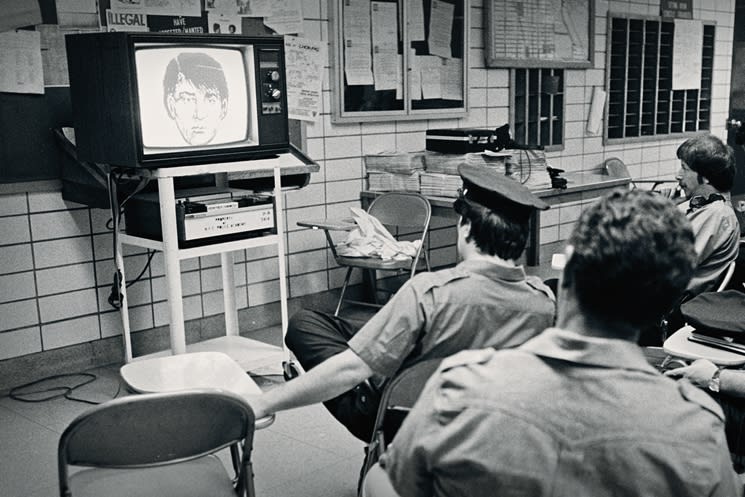On August 10, 1977, David Berkowitz was arrested for the murder of six people and the wounding of seven others between the summers of 1967 and 1977. Penned "The Son of Sam," a reference to a letter that the murderer sent New York City police during their infamous cat-and-mouse game, the serial killer's capture provided relief for the majority of New Yorkers — except for Maury Terry, a local investigative journalist, who became convinced that Berkowitz not only worked with multiple partners, but also committed his crimes as a series of ritual Satanic cult sacrifices.
Working through the first episode, "Hello from the Gutters," explains the rocky state of New York City in the mid-'70s, and how the Son of Sam's crimes derailed the public's trust in their police force — displayed by stereotypical over-editing and a particularly stiff "true crime podcaster" voiceover from Paul Giamatti, which was an odd choice. By the tail end of the debut episode, director Joshua Zeman leaves his audience on a cliffhanger. What if the tightly wrapped investigation was messier than it appeared? What if NYC police purposefully ignored valuable evidence? What if Berkowitz's crimes were actually a form of Satanic ritualistic killings?
Zeman leads us to believe that the well documented Son of Sam tale is just the tip of the iceberg, that by watching The Son of Sam: A Descent into Darkness, you'll witness the breakthrough independent investigation into a serial-killing crime spree that New York City police refused to fully uncover. Instead, the docuseries follows coincidences, theories and ramblings, often settling for speculation fiction rather than fact, leaving viewers bewildered as to where their last four hours went. Terry's obsession with Berkowitz's supposed "Satanic cult" ties are reminiscent of the '80s-'90s Satanic Panic era in North America, a time when conspiracies claimed that rock music and Dungeons & Dragons were brainwashing kids and encouraging them to worship the Devil. Real-life arrests and condemnations of innocent people were conducted under the cloak of "Satanic worship" — see the West Memphis Three case, or the McMartin preschool case.
What should have been a story about yet another Berkowitz victim, Terry, succumbing to conspiracy thought and Berkowitz's manipulative sociopathy, instead becomes yet another sensationalistic Netflix true crime setback. The Sons of Sam is too preoccupied with tabloid-esque journalism and conspiracies to respectfully acknowledge Maury Terry's misguided investigations, and abandons facts in preference for scandalous fiction.
(Netflix)Working through the first episode, "Hello from the Gutters," explains the rocky state of New York City in the mid-'70s, and how the Son of Sam's crimes derailed the public's trust in their police force — displayed by stereotypical over-editing and a particularly stiff "true crime podcaster" voiceover from Paul Giamatti, which was an odd choice. By the tail end of the debut episode, director Joshua Zeman leaves his audience on a cliffhanger. What if the tightly wrapped investigation was messier than it appeared? What if NYC police purposefully ignored valuable evidence? What if Berkowitz's crimes were actually a form of Satanic ritualistic killings?
Zeman leads us to believe that the well documented Son of Sam tale is just the tip of the iceberg, that by watching The Son of Sam: A Descent into Darkness, you'll witness the breakthrough independent investigation into a serial-killing crime spree that New York City police refused to fully uncover. Instead, the docuseries follows coincidences, theories and ramblings, often settling for speculation fiction rather than fact, leaving viewers bewildered as to where their last four hours went. Terry's obsession with Berkowitz's supposed "Satanic cult" ties are reminiscent of the '80s-'90s Satanic Panic era in North America, a time when conspiracies claimed that rock music and Dungeons & Dragons were brainwashing kids and encouraging them to worship the Devil. Real-life arrests and condemnations of innocent people were conducted under the cloak of "Satanic worship" — see the West Memphis Three case, or the McMartin preschool case.
What should have been a story about yet another Berkowitz victim, Terry, succumbing to conspiracy thought and Berkowitz's manipulative sociopathy, instead becomes yet another sensationalistic Netflix true crime setback. The Sons of Sam is too preoccupied with tabloid-esque journalism and conspiracies to respectfully acknowledge Maury Terry's misguided investigations, and abandons facts in preference for scandalous fiction.
